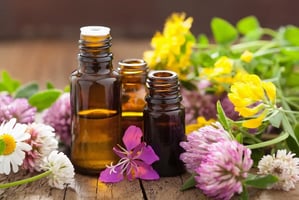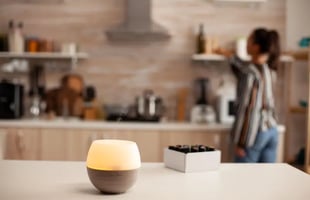Optimized diffusion for home and office: technical protocols
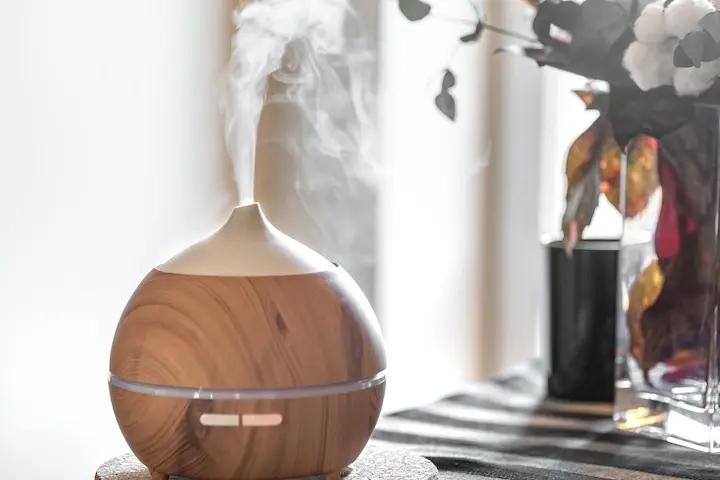
Diffusing essential oils at home and at work: top tips
Would you like to enjoy the benefits of essential oils at home or in the office? Diffusion is an excellent way to benefit from their virtues while pleasantly perfuming your home or workplace. Purify the air, relax, improve concentration... Diffused essential oils bring many benefits to your daily life.
But how do you choose the right essential oils and diffuser? What precautions should you take, especially with children or in the workplace? Discover all our expert advice on aromatherapy in this comprehensive guide.
On the program
- The best essential oils to diffuse in the presence of children
- Purifying indoor air with essential oils
- Diffusing essential oils for well-being and concentration at work
- Precautions and contraindications for diffusing essential oils
- Choosing the right essential oil diffuser
What you need to remember from this article:
Here are the 3 main points to remember from this comprehensive article on diffusing essential oils at home and at work:
- Diffusing essential oils lets you enjoy their many benefits: purifying indoor air, eliminating unpleasant odors, promoting relaxation and well-being, boosting concentration and creativity. It's a simple, effective method that can be adopted at home or in the office.
- It's important to choose your essential oils carefully, and to take the necessary precautions to ensure risk-free diffusion. Essential oils must be of the highest quality, 100% pure and natural. Some essential oils should be avoided or used sparingly. Diffusion duration and frequency should be adapted to the essential oils chosen and the room to be diffused.
- Different types of diffusers exist to suit all needs: from electric diffusers (misting, nebulizing, ventilation, gentle heat) to natural diffusers (porous pebbles, hot water bowls...). The choice of diffuser depends on the intended use (home, office, travel), the size of the room and the budget. In all cases, we recommend using a quality diffuser to preserve the properties of the essential oils.
In short, diffusing essential oils is a simple and effective way to enjoy their benefits on a daily basis, provided you choose your oils and diffuser carefully, and take the necessary precautions for risk-free use.

1. Diffusing essential oils suitable for children
Diffusing essential oils is a particularly popular gentle method of soothing children and purifying the air in their bedrooms. But not all essential oils are suitable for young children, and certain precautions must be taken.
Precautions to take and essential oils to avoid
Before the age of 3 months, we recommend avoiding any diffusion of essential oils. From 3 months to 3 years of age, prefer a short atmospheric diffusion (10 minutes maximum) with mild essential oils, 1 to 2 times a day maximum.
Some essential oils should not be used on children, as they contain powerful, irritating and potentially toxic molecules. This is the case for essential oils rich in phenols, ketones or camphor, such as Oregano(Origanum vulgare), Thyme (Thymusvulgaris), Peppermint(Mentha x piperita), Rosemary (Rosmarinus officinalis camphoriferum) or Rosemary (Rosmarinus officinalis verbenoniferum).
Selection of gentle essential oils to soothe baby and children
To soothe baby and help him or her fall asleep peacefully, opt for essential oils with calming, relaxing properties such as:
● True Lavender(Lavandula angustifolia), a safe bet known for its soothing properties on the nervous system thanks to its linalyl acetate and linalool content. It makes it easier to fall asleep and provides quality sleep.
● Sweet orange(Citrus sinensis), rich in limonene and delicately scented, helps relieve tension and restore a state of calm and serenity conducive to sleep.
● Green Mandarin(Citrus reticulata), sweet and fruity, is relaxing and facilitates relaxation of body and mind thanks to its limonene content. It is very popular with children for its gourmand scent.
Synergy recipes and tips for diffusing in children's bedrooms
To create a relaxing atmosphere in your child's bedroom, you can diffuse a synergy of calming essential oils such as:
● 1 drop of True Lavender, 1 drop of Green Mandarin, 1 drop of Petit Grain Bigarade(Citrus aurantium var. amara) in a diffuser suitable for a room of 10 to 15 m2.
● 1 drop of Sweet Orange and 1 drop of Bergamot(Citrus aurantium bergamia) in a diffuser for a room less than 10 m2.
Be sure to respect the recommended doses, diffuse for a short time (10 minutes maximum) and air the room after diffusion. Always place the diffuser out of the child's reach, and far enough away from the bed so that he or she is not directly exposed to the essential oils.
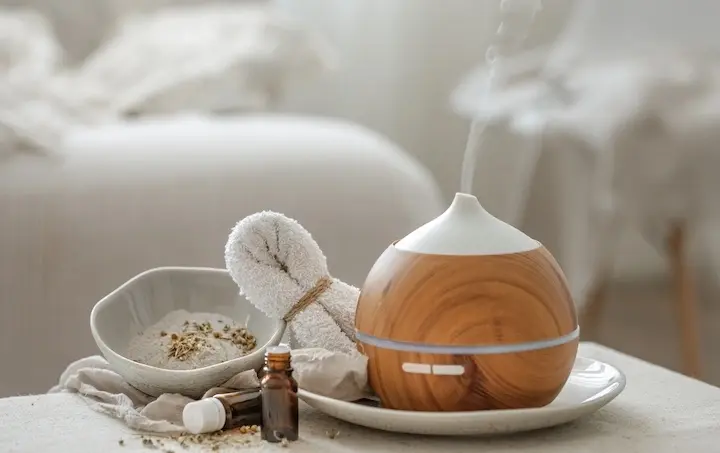
2. Purify indoor air with essential oils
In addition to pleasantly perfuming your home, diffusing essential oils purifies and purifies the air, while scenting the rooms in your home. Some essential oils have very interesting purifying and disinfecting properties.
Purifying and sanitizing properties of certain essential oils
Essential oils renowned for their purifying and sanitizing virtues include:
● Tea tree(Melaleuca alternifolia), a must-have with powerful antiseptic and antibacterial properties thanks to its high content of terpene alcohols such as terpinene 4-ol. It effectively combats airborne microbes, viruses and bacteria.
● Lemon(Citrus limon), highly effective at deodorizing and purifying the atmosphere, with its concentration of monoterpenes. Its fresh, invigorating fragrance makes it an ideal ally for purifying ambient air.
● Radiant Eucalyptus(Eucalyptus radiata), particularly rich in 1.8 cineol, appreciated for its purifying and oxygenating virtues. It helps clear the respiratory tract and prevent winter infections.
● Maritime pine(Pinus pinaster), which purifies the air and boosts natural defenses thanks to its antiseptic properties conferred by its high alpha-pinene content. Its woody scent is reminiscent of the Landes forest and adds a note of freshness.
Other essential oils such as Ravintsara(Cinnamomum camphora), evergreen cypress(Cupressus sempervirens) or balsam fir(Abies balsamea) also have interesting properties for purifying indoor air.

Diffuse to dispel unpleasant odours and perfume naturally
Diffusing essential oils will effectively eliminate unpleasant odors (tobacco, pets, cooking, etc.) and naturally perfume your home. Choose essential oils with fresh, purifying notes, such as lemon, sweet orange, maritime pine or radiant eucalyptus.
For example, you can diffuse a few drops of Lemon and Sweet Orange to deodorize and bring a clean scent to your home. Maritime Pine essential oil is ideal for purifying the air while adding a pleasant undergrowth scent.
For a purifying and soothing effect, diffuse a blend of Radiant Eucalyptus and True Lavender. Radiant Eucalyptus purifies the air, while True Lavender adds a relaxing note.
Essential oil recipes for a healthy office environment
You can also take advantage of the purifying and purifying benefits of essential oils in the workplace. Here are 2 recipes for diffusing in the office to create a healthy working environment:
Purifying and energizing recipe:
● 50 drops Lemon essential oil
● 30 drops maritime pine
● 20 drops of Eucalyptus radiata
Purifying and soothing recipe:
● 50 drops Tea tree
● 30 drops True Lavender
● 20 drops Sweet Orange
Pour the chosen synergy into a 30 ml tinted glass bottle. Diffuse 5 to 10 drops in a suitable diffuser, 2 to 3 times a day for 10 to 30 minutes. Remember to air the room well after each diffusion.

3. Diffusing essential oils for well-being and concentration at work
In addition to purifying the air in your workspace, diffusing essential oils can help you relax, manage stress better and boost your powers of concentration. So you can improve your well-being and performance at work!
Effects of essential oils on the mind: anti-stress, relaxing, stimulating...
When diffused, essential oils act directly on the brain's limbic system, the seat of emotions and memory. Certain aromatic molecules thus have specific effects on the mind:
● Esters soothe the nervous system and help manage stress and emotions. They are found in essential oils of Lavender(Lavandula angustifolia), Petit Grain Bigarade(Citrus aurantium var. amara), Roman Chamomile(Anthemis nobilis)...
● Terpene ketones have balancing properties on the nervous system. Present in Rosemary cineole(Rosmarinus officinalis cineoliferum), for example, they clarify the mind and stimulate concentration.
● Monoterpenes such as pinene from Pinus pinaster or limonene from citrus fruits are tonic and energizing. They help combat mental fatigue.
When diffused, these molecules act synergistically to help you better manage stress, relax or, on the contrary, boost your powers of concentration, depending on the essential oils you choose.
Essential oils to boost concentration and creativity
To boost your concentration and creativity at work, opt for stimulating and energizing essential oils such as:
● Lemon, tonic and stimulating, clarifies ideas and helps you concentrate. It is particularly recommended in case of fatigue.
● Rosemary, which boosts concentration and stimulates cognitive functions. It helps keep the mind clear and focused, ideal in times of exams or stress.
● Clary sage(Salvia sclarea), which opens and stimulates the mind. It promotes creativity and helps to come up with new ideas, perfect for artistic professions.
You can diffuse these essential oils alone or in synergy. For example, mix 40 drops of Lemon, 40 drops of Rosemary cineole and 10 drops of Clary Sage in a tinted glass bottle. Diffuse 5 drops of this stimulating blend in your office to help you stay focused.
Diffuse in open-plan offices or practices to relax patients/clients
If you work in an open-plan office or receive patients/clients in your practice, you can use essential oil diffusion to create a warm, relaxed working atmosphere.
To relieve stress and tension in an open-plan office, choose relaxing essential oils such as True Lavender, Sweet Orange, Petit Grain Bigarade or Ylang-Ylang(Cananga odorata). For example, you can diffuse a blend of 5 drops of True Lavender and 5 drops of Sweet Orange to promote relaxation and serenity.
In a waiting room or doctor's surgery, opt for soothing, reassuring essential oils such as True Lavender, Green Mandarin or Petit Grain Bigarade. A synergy of 3 drops of Green Mandarin, 3 drops of True Lavender and 3 drops of Petit Grain Bigarade will help your patients relax before their appointment.
Be sure to diffuse at a distance from patients/clients and air the room regularly. Some people may be sensitive to essential oils, so always ask for their agreement before diffusing.
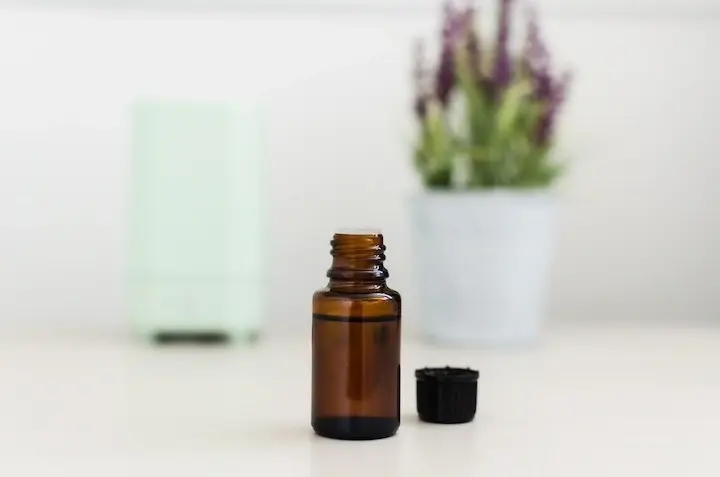
4. Precautions and contraindications to essential oil diffusion
Although essential oil diffusion is a gentle method of use, there are a number of precautions that must be taken to ensure its safe application. Here are the precautionary rules to be aware of.
Rules of caution: limited duration, quantity of drops, aeration...
For risk-free diffusion, please observe the following rules:
● Do not diffuse for more than 30 minutes, 3 to 4 times a day. Beyond that, the air becomes saturated and the aromatic molecules can become irritating to the respiratory tract.
● Respect the recommended quantity of drops depending on the size of the room and the type of diffuser, generally 5 to 10 drops.
● Always air the room after diffusion to renew the air and avoid the accumulation of aromatic molecules.
● Don't leave the diffuser running continuously, preferring diffusion intervals of 10 to 30 minutes spaced throughout the day.
● Always place the diffuser high up, out of reach of children and pets. Do not stand too close to the diffuser.
● Switch off the diffuser and ventilate immediately in the event of respiratory discomfort or headaches.
By observing these precautions, you can enjoy the benefits of essential oil diffusion with peace of mind.
Essential oils to avoid or use sparingly
Some essential oils are irritating, allergenic or even toxic by the respiratory route. We therefore strongly advise against diffusing them, even occasionally:
● Phenol-rich essential oils such as Clove(Eugenia caryophyllus), Cinnamon(Cinnamomum verum), Mountain Savory(Satureja montana), Oregano(Origanum vulgare), Thyme (Thymusvulgaris), ... Highly irritating to the mucous membranes, they should not be used as diffusers.
● Essential oils rich in terpene aldehydes, such as Lemongrass or Indian Verbena(Cymbopogon flexuosus), Lemon Balm(Melissa officinalis), Lemon Eucalyptus(Eucalyptus citriodora)... Allergenic, they should be avoided or used sparingly.
● Essential oils rich in ketones, such as Peppermint(Mentha x piperita), Eucalyptus globulus, Rosemary camphor(Rosemary officinalis camphoriferum), Sage officinale(Salvia officinalis)... Neurotoxic in high doses, they should be diffused punctually and in small quantities.
● Lactone-rich essential oils such as Helichrysumitalicum or Inulagraveolens should also be avoided for diffusion, as they can be neurotoxic.
As a general rule, always respect the recommended doses and do not diffuse essential oils pure, but diluted in water to limit the risk of respiratory tract irritation.
Sensitive persons: pregnant women, babies, epileptics, asthmatics, etc.
Some people are more sensitive to essential oils than others, and need to take extra care when diffusing them. This applies to pregnant and breast-feeding women, babies and young children, the elderly, epileptics, asthmatics and people with allergies or chronic respiratory problems.
Pregnant women should avoid diffusing essential oils during the first 3 months of pregnancy. Thereafter, use mild essential oils such as True Lavender or Sweet Orange, for a maximum of 5 to 10 minutes a day.
For babies over 3 months and children under 6 years of age, only use short, occasional diffusions of mild essential oils(True Lavender, Sweet Orange, Green Mandarin, etc.). Prefer atmospheric diffusion away from the baby.
For people suffering from epilepsy, asthma or allergies, always ask your doctor's advice before using an essential oil diffuser. Certain aromatic molecules may be contraindicated.
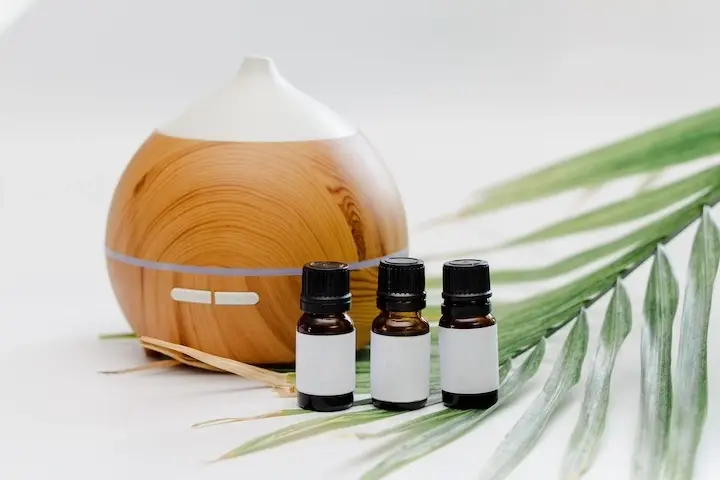
5. Choosing the right essential oil diffuser
There are different types of essential oil diffusers, more or less well adapted to the use you wish to make of them and the size of the room to be diffused. Here's an overview of the main diffusion techniques.
Electric diffusers: misting, nebulization, ventilation...
Electric diffusers are the most common and easiest to use on a daily basis. There are several types:
● The misting or ultrasonic diffuser: uses high-frequency vibrations to create a fine mist of water droplets and essential oils. Easy to use, it's ideal for humidifying ambient air.
● The nebulizer diffuser: sprays essential oils directly into the air, without adding water, for powerful diffusion. Better suited to larger rooms, it requires more essential oils.
● Ventilation diffuser: fitted with a fan, it diffuses aromatic molecules into the air by simple cold evaporation. Quiet, it's ideal for the bedroom.
● The gentle heat diffuser: this diffuses essential oils by evaporation using a gentle heat source (tea light, electric burner, etc.). However, heat can alter the properties of essential oils.
Choose your electric diffuser according to the size of the room to be diffused, your intended use (ambiance, purification, well-being...) and your budget.
Find out more in the article How many drops of essential oils in a diffuser?
Natural diffusers: by capillary action on a porous pebble, in a bowl of hot water...
Essential oils can also be diffused naturally, without the need for an electrical appliance. Natural diffusion techniques include ..:
● Diffusion by capillary action on a porous pebble: simply place a few drops of essential oil on a porous clay or ceramic pebble. By capillary action, the aromatic molecules gradually diffuse into the air.
● Atmospheric diffusion into a bowl of hot water: simply pour a few drops of essential oil into a bowl of hot water for rapid diffusion into the room.
● Application to a handkerchief or tissue: soak a tissue or cotton square in a few drops of essential oil and breathe deeply. You can also place the handkerchief on your pillow to enjoy the benefits of essential oils while you sleep.
These natural diffusion techniques are ideal for occasional use or when you don't have an electric diffuser at hand (at the office, on the move...).
Models suitable for home or larger workspaces
To perfume and purify the air in your home, an electric ultrasonic or fan diffuser is the best choice. Choose a model with sufficient capacity to cover the surface area of the room to be diffused (from 10 to 40 m2 depending on the diffuser).
If you wish to diffuse essential oils in your workplace, in an open space or a large meeting room, opt for a powerful electric diffuser such as a nebulizer. This will enable you to diffuse the oils effectively in a large volume without having to recharge it too often.
For nomadic use in the office, you can opt for a small USB electric diffuser or a battery-powered portable diffuser. Easy to carry, they'll let you recreate a bubble of well-being wherever you are.

Optimize the benefits of essential oils
As you'll have guessed, diffusing essential oils is the best way to enjoy their health and well-being benefits, whether at home or in the workplace. By choosing your essential oils and diffuser wisely, you can ..:
● Purify and purify indoor air
● Eliminate unpleasant odors and pleasantly scent your home
● Relax and let go after a stressful day
● Boost your concentration and creativity at work
● Create a warm, soothing atmosphere in an open space or waiting room
For a serene use of essential oils in diffusion, always respect the precautions for use (duration of diffusion, aeration, oils to avoid...) and choose quality essential oils, 100% pure and natural, preferably organic. Find a wide selection of essential oils onLandema.com, the specialist in online sales of professional-quality natural extracts direct from the producer.
If you would like to find out more about using essential oils for your daily well-being, don't hesitate to ask an aromatherapist for advice on the best combinations and precautions to take according to your needs.
Diffusing essential oils is an invaluable ally for your health and balance, so don't delay!

